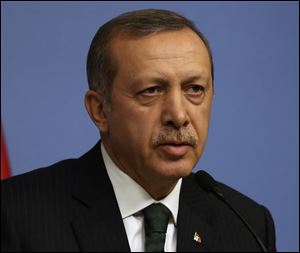
EDITORIAL
Turkey’s turmoil
1/13/2014
Erdogan
The political problems of Turkey’s prime minister, Recep Tayyip Erdogan, over corruption charges coincide with a decline in his country’s influence in foreign affairs.
Under Mr. Erdogan, who has been in office for 10 years, Turkey seemed to be in a promising position, not only in its domestic situation but also in its potential to play a leadership role in the troubled Middle East and the rest of the world.
It had decent relations with Israel. It was moving closer to association with the European Union. It appeared capable, as a majority-Islamic democracy, of serving as a badly needed bridge between the West and Muslim nations.
But things went wrong. Turkey’s internal politics are boiling, as elections are scheduled for March. Turkey fell out with Israel over a 2010 Israeli attack on a Turkish ship, which resulted in the deaths of eight Turks and a Turkish-American.
The EU put up so many barriers to association that Turkey lost interest. The Arab Spring, and especially the civil war in Syria, presented Turkey with a heavy refugee flow and tension with Syrian rebels based in Turkey.
Now, charges of graft and bribery against the sons of three cabinet ministers are chipping away at the grip Mr. Erdogan and his party have had on Turkish politics. U.S. relations with Turkey, which were based on useful cooperation between Mr. Erdogan and President Obama, are also slipping.
Dating from the end of World War II, the U.S.-Turkish alliance is important. For that reason and others, the United States needs to show understanding as Turkey works through its problems.